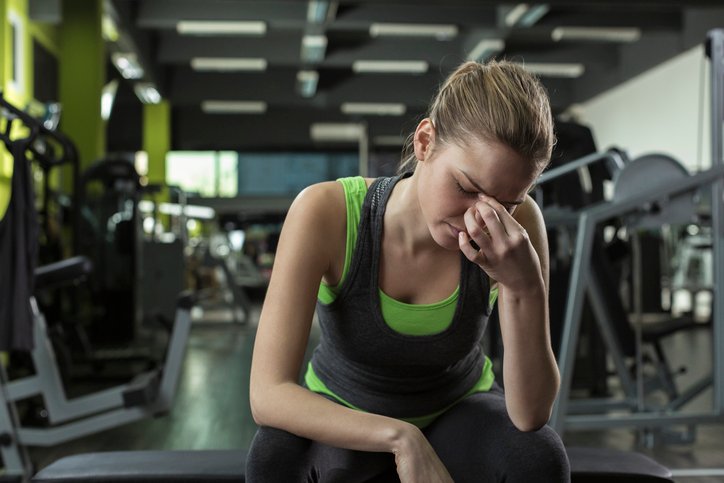
For a person to live a healthier life, one must understand is there any link exists in involving significantly doing intense activities and the possible outcomes to the general body functioning and condition. Can the extreme push to the limit for our bodies result in ones having a headache? The investigations include finding wither the intense exercise you are doing can be the only thing affecting your head and find the combination of other things which might turn out to be the headache cause.
Does Over Exercise Cause Headaches?
What are Exercise-Induced Headaches?
Exercise-induced headaches divide into two broad types: primary and secondary. While the first, including migraines and tension-type headaches, are not only precipitated, rather than triggered, by physical activity, secondary ones can imply more severe issues.
Causes and Triggers:
Dehydration: Electrolyte imbalance is crucial in exercise-induced headaches, which suggests hydration is more than just about water.

Tension and Stress: Muscle tension as a result of excessive exertion is a widely recognized factor as a cause of a tension-type headache .
Posture and Strain: Poor form or simply applying too much effort, in particular when working out, can result in contraction of the muscles of the neck and head, which in turn can manifest as a headache.
The Role of Hydration:
Hydration and Headaches:
The relationship between headaches and the lack of water is intricate Since dehydration not only affects fluid balance but also alters the levels of electrolytes in the body, which is a much more substantial contributor to getting headaches on its own accord.

Tips for Optimal Hydration:
Pre-Workout Hydration: It is important to prioritize sufficient water consumption and contemplate consuming beverages that are rich in electrolytes for longer periods of time.
During Exercise: It is recommended to consume fluids at the regular intervals, as well as make due adjustment to your liquid intake depending on the duration and intensity of your sessions to ensure proper hydration.
Post-Workout Rehydration: The disrupted fluid balance, affecting you due to exercise, can be restored by regularly eating water-rich food and recharging your electrolytes .
Exercise Intensity and Headaches:

Moderation is Key:
Granted, for the reasons provided, there is no reasoning for dismissing the significance of exercising what comes to a high intensity to headaches. While moderate exercising induces the release of endorphins, which are good for health, too much stress, causing pain, shall be avoided.
Gradual Progression:
Therefore, it is very important to increase exercise intensity gradually. Such a sharp increase in the intensity of training sessions causes enormous stress on the cardiovascular system and can also lead to the occurrence of headaches. The use of a progressive overload strategy of the necessary overload and level of training for each person can prevent these consequences .
Recognizing Warning Signs:
Listen to Your Body:
All individuals typically vary in their responses to exercises. It is highly important to meticulously.watch out for warning signs, including dizziness, nausea, and heavy or repeated headaches. These could potentially signify internal problems.

Consultation with a Professional:
A professional evaluation is required for heavy or high-frequency headaches. Healthcare professionals also can do an examination to determine root sources and therapies that are necessary to ensure long-term wellness.
Also Read – Does Eating Bread Cause acne?
Balancing the benefits of physical activity and possible consequences is something everyone must strive for. An individual is unlikely to avoid an exercise-induced headache; however, when one is aware of what leads to such a complication, pertinent decisions can be made. Through ensuring hydration, controlling exercise loads, and noticing the potential red flags, people can tailor the activities in such a way that they are beneficial rather than harmful.
No doubt that overly hard physical activity can cause headache, and understanding the reasons for this is extremely important to maintain a properly balanced fitness routine. Although regular physical activity is necessary for maintaining good health, putting too much strain on one’s body and rapidly increasing the load in training can be a cause of headache. This is often due to dehydration, which emphasizes the importance of maintaining adequate water intake before, during, and after exercise.
Distressing can also result in an overexertion tension headache, mainly if you do not give it ample time to recover after intensive drills. Tension headaches may develop if there is an awkward position while performing, continuous stiffening of the neck, and clamping the jaws. One method to ensure you do not exceed what is safely within your capability is to integrate proper warm-up and cool-down protocols into your schedule and always be on the lookout for the cues your body gives.
Lack of adequate nourishment or failure to eat before participating in physical exercise can result in low blood sugar and, in turn, cause a headache . Therefore, it is important to consume a healthy diet and pay attention to providing enough fuel for the body to sustain the workout sessions.
Frequently Asked Questions (FAQs)
Can over exercise really cause headaches?
Yes, Excessive physical activity can cause such kind of headaches. There might be various reasons for this, including but not limited to dehydration, muscle strain, and serious underlying conditions. However, it is important to listen to the body and find a harmonious approach to working out.
How can I differentiate between a regular headache and an exercise induced headache?
Exercise-induced headaches typically occur while exercising or immediately afterward intense exertion; such headaches can be well recognized with prior probabilities to exercise. Should such headaches become more intense or persistent, the patient should seek medical attention to rule out possible other etiologies.
Is dehydration a common trigger for exercise-induced headaches?
Yes, Dehydration is a common context. A deficit of body fluids and electrolytes is experienced by our bodies in the course of activity when it is done at a high intensity or duration. Proper hydration must be maintained for the situation to avoid these exercise-induced headaches.
How can poor posture contribute to headaches during exercise?
Incorrect posture increases the load on the neck, which can cause tension headaches. It is possible to combat this problem by aligning and including exercises that improve posture.
Is it necessary to warm up before every workout to prevent headaches?
A warm-up is necessary, as it prepares the body for subsequent physical activity, which, in turn, reduces the risk of headache and other unpleasant sensations when doing physical exercises .
Can skipping meals before exercise lead to headaches?
Inadequate nutrition, more precisely, a drop in blood sugar levels, can also become a causative factor in the occurrence of headaches. Therefore, before performing certain types of exertion, it is necessary to consume food or a snack. In addition, it will be useful to create a detailed commercial about your life.




















